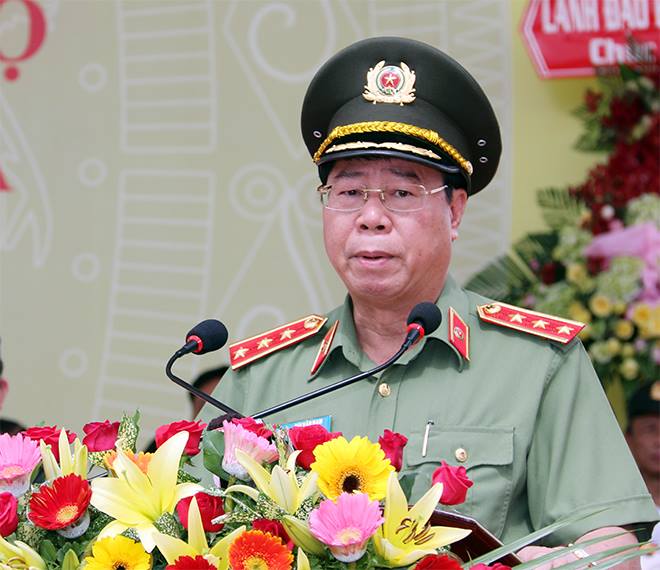Public Security forces contribute to sustainable development of Mekong Delta
- Deputy Minister Bui Van Nam works with Lai Chau Police
- Deputy Minister Bui Van Nam works with Krong Bong District Police
- Deputy Minister Bui Van Nam visits Public Security Newspaper
The Conference on Sustainable and Climate Resilient-Development for Mekong Delta which took place in Can Tho on September 27-29 has been considered the largest of this kind so far. The conference aimed to discuss measures, propose initiatives and make important decisions on sustainable development and prosperity for the Mekong Delta.
On the sidelines of the important conference, the Public Security Newspaper interviewed Senior Lieutenant General Bui Van Nam, Deputy Minister of Public Security on the task of ensuring political security, social order and safety in the Mekong Delta.
 |
| Senior Lieutenant General Bui Van Nam, Deputy Minister of Public Security |
Reporter: Senior Lieutenant General Bui Van Nam, could you give assessments of the social order situation in the Mekong Delta over the past time?
Deputy Minister Bui Van Nam: The Mekong Delta is an important strategic location in terms of politics, economics, society as well as national security and defense. Over the past years, under the leadership of the Party and State, especially the direct guidance of the Politburo, the Secretariat, Prime Minister as well as the joint effort of the Fatherland Front, the Vietnam People's Army, local authorities at all levels and people, the Public Security Forces in general and the police units in the Mekong Delta have well played its core role in implementing many projects to ensure social order and safety in the region.
The public security forces actively grasped developments of the situation, promptly detected, prevented and struggled against conspiracies of hostile and reactionary forces and fought crimes as well as handled serious cases at the embryo stage, creating positive changes in social order and safety and contributing to promoting socio economic development and conducting social welfare policies in the Mekong Delta.
However, the situation of social security and order still sees potential complexity. In addition to traditional security, the Mekong Delta still faces non-traditional security factors relating to water resource security, environment security, food safety and rural security.
Typically, droughts and salt water infiltration in late 2015 and early 2016 caused serious damage to livestock production, agricultural production, aquaculture, badly affecting lives of people in the region. All these issues clearly have resulted from climate change.
Although the Mekong Delta is the largest agricultural production region in the country, the fast-growing industrial parks are putting pressure on the environment. The increasing migration from the provinces of the Mekong Delta to Ho Chi Minh City and the Southeast provinces has caused a shortage of labor in the Southwestern provinces as well as other implications for ensuring social security, health and education.
In addition, land disputes and complaints as a result of the process of rural urbanization, and new types of crimes have caused much concern in the society.
Reporter: At the conference, delegates also pointed out many challenges for the Mekong Delta in the future. Can you name some pressing issues relating to social order in the whole region in the coming time?
Deputy Minister Bui Van Nam: On one hand, we are all aware that the Mekong Delta is a potential region which plays an important role in socio-economic development of the country. Each year, the region produces 50% of the country's total food production, 90% of Vietnam's rice export and 60% of the country's seafood export. As one of the world's leading rice exporter, the role of the Mekong Delta is significant to not only Vietnam's food security but also the world's food security.
On the other hand, the Mekong Delta is facing major challenges regarding security issues caused by negative impacts of climate change. The Mekong Delta is one of the four deltas in the world worst affected by climate change.
Especially, sea level rise and fresh water shortage represent deep concern to authorities and experts. According to scientists, the entire Mekong Delta region will disappear in 100 years’ time if we do not have an efficient plan to deal with landslides and subsidence situations.
The decreasing of sediment and increasing of salt water will severely affect the ecosystems and environment. This leads to a radical change in the pattern of production, habits of living and daily life of local people.
In short, the more negative impacts climate change has on agricultural production and people's livelihoods, the more serious social problems, including crimes, are generated.
Reporter: So, what should the public security forces do to contribute to sustainable development of the Mekong Delta, Deputy Minister?
Deputy Minister Bui Van Nam: First, the Public Security Forces should raise awareness of social order challenges in the Mekong Delta in the new situation, especially non-traditional security challenges.
Then, relevant police units should promptly report to higher authorities, and advise the Party, the State as well as local authorities at all levels on optimal measures to maintain political security, to improve both material and cultural lives of local people, and implement planned projects in harmony with the standard strategies and policies. At the same time, forecasting needs to be invested in to achieve high efficiency.
The State management of social order should create favorable conditions for local people and enterprises to develop production, trade and tourism, contributing to improving the local business investment environment.

